2024年中考英语复习词法专题形容词课件(共16张PPT)
文档属性
| 名称 | 2024年中考英语复习词法专题形容词课件(共16张PPT) |

|
|
| 格式 | pptx | ||
| 文件大小 | 840.6KB | ||
| 资源类型 | 教案 | ||
| 版本资源 | 通用版 | ||
| 科目 | 英语 | ||
| 更新时间 | 2024-05-26 19:18:32 | ||
图片预览

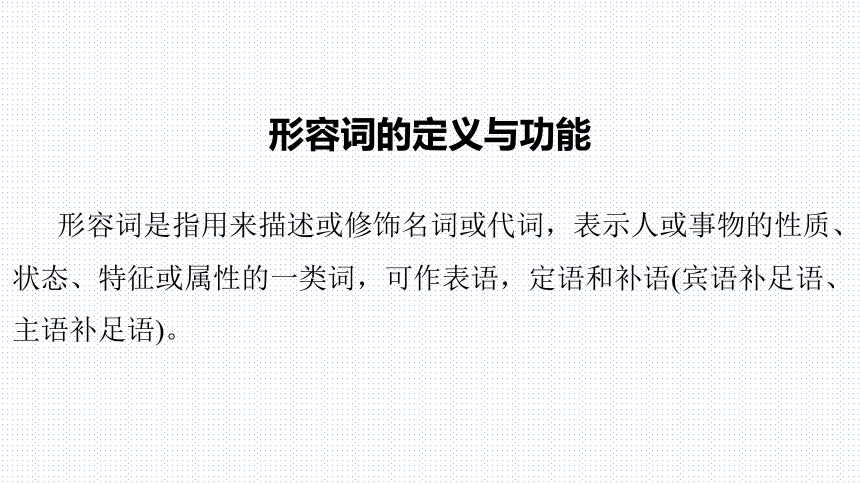
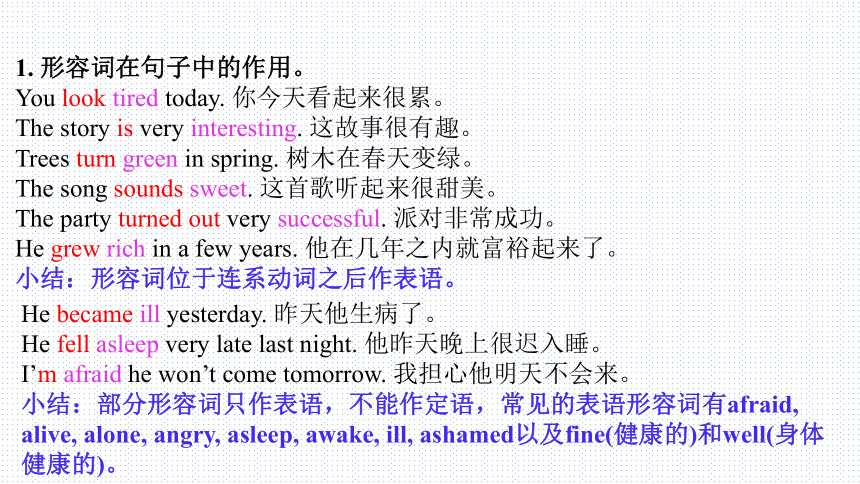
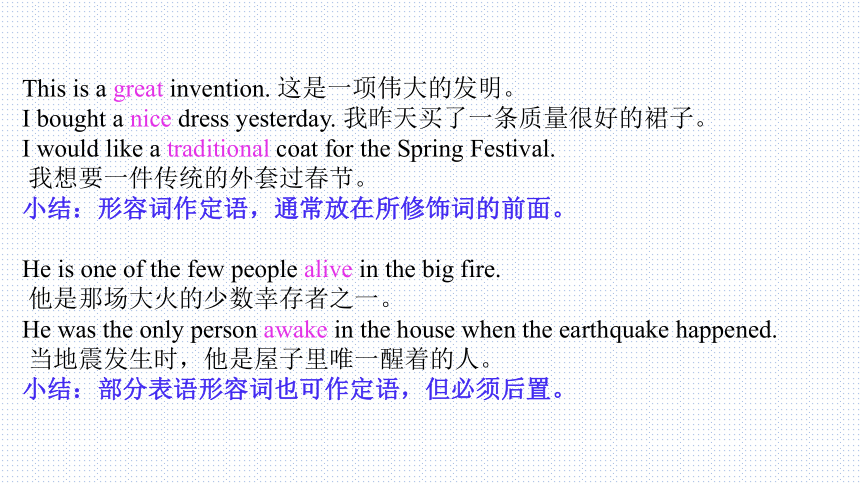
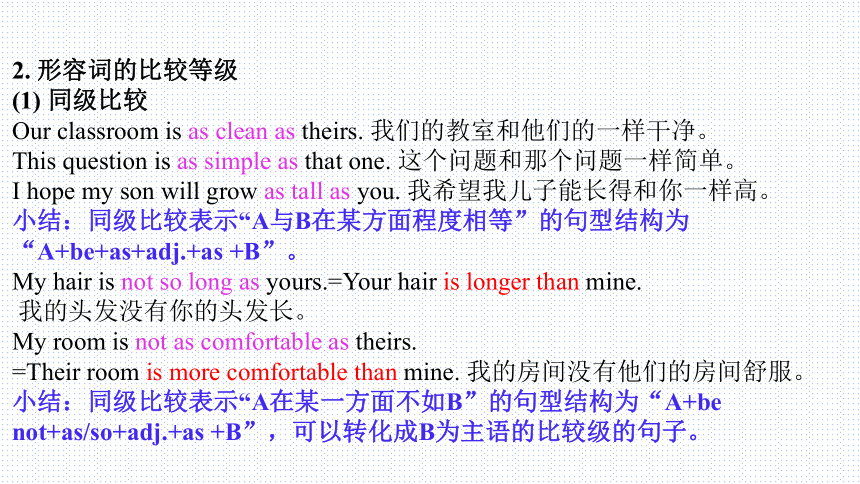
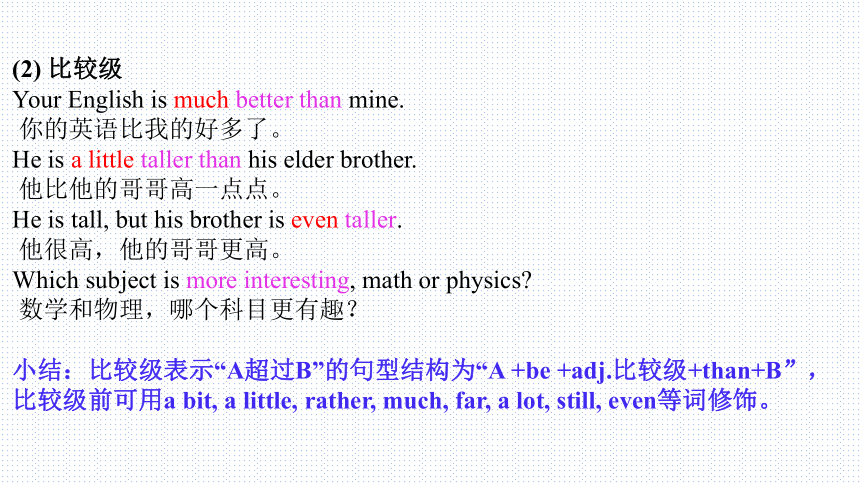
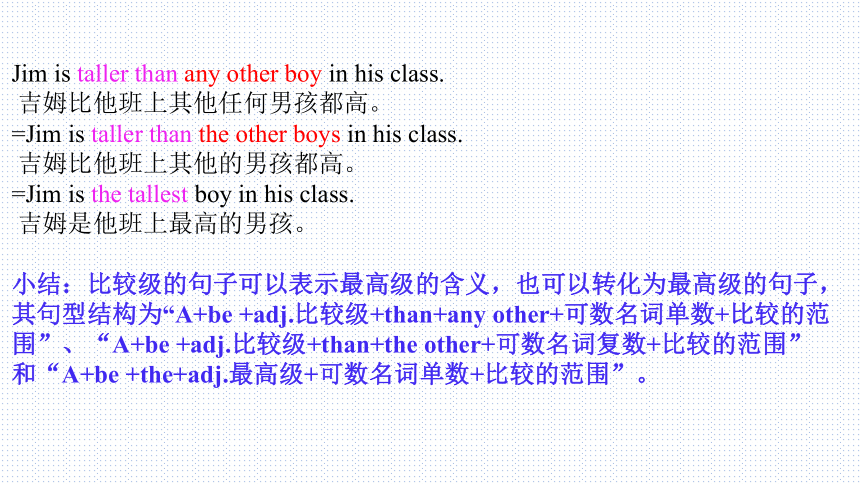
文档简介
(共16张PPT)
2024年中考英语复习词法专题★★
形容词
形容词是指用来描述或修饰名词或代词,表示人或事物的性质、状态、特征或属性的一类词,可作表语,定语和补语(宾语补足语、主语补足语)。
形容词的定义与功能
1. 形容词在句子中的作用。
You look tired today. 你今天看起来很累。
The story is very interesting. 这故事很有趣。
Trees turn green in spring. 树木在春天变绿。
The song sounds sweet. 这首歌听起来很甜美。
The party turned out very successful. 派对非常成功。
He grew rich in a few years. 他在几年之内就富裕起来了。
小结:形容词位于连系动词之后作表语。
He became ill yesterday. 昨天他生病了。
He fell asleep very late last night. 他昨天晚上很迟入睡。
I’m afraid he won’t come tomorrow. 我担心他明天不会来。
小结:部分形容词只作表语,不能作定语,常见的表语形容词有afraid, alive, alone, angry, asleep, awake, ill, ashamed以及fine(健康的)和well(身体健康的)。
This is a great invention. 这是一项伟大的发明。
I bought a nice dress yesterday. 我昨天买了一条质量很好的裙子。
I would like a traditional coat for the Spring Festival.
我想要一件传统的外套过春节。
小结:形容词作定语,通常放在所修饰词的前面。
He is one of the few people alive in the big fire.
他是那场大火的少数幸存者之一。
He was the only person awake in the house when the earthquake happened.
当地震发生时,他是屋子里唯一醒着的人。
小结:部分表语形容词也可作定语,但必须后置。
2. 形容词的比较等级
(1) 同级比较
Our classroom is as clean as theirs. 我们的教室和他们的一样干净。
This question is as simple as that one. 这个问题和那个问题一样简单。
I hope my son will grow as tall as you. 我希望我儿子能长得和你一样高。
小结:同级比较表示“A与B在某方面程度相等”的句型结构为“A+be+as+adj.+as +B”。
My hair is not so long as yours.=Your hair is longer than mine.
我的头发没有你的头发长。
My room is not as comfortable as theirs.
=Their room is more comfortable than mine. 我的房间没有他们的房间舒服。
小结:同级比较表示“A在某一方面不如B”的句型结构为“A+be not+as/so+adj.+as +B”,可以转化成B为主语的比较级的句子。
(2) 比较级
Your English is much better than mine.
你的英语比我的好多了。
He is a little taller than his elder brother.
他比他的哥哥高一点点。
He is tall, but his brother is even taller.
他很高,他的哥哥更高。
Which subject is more interesting, math or physics
数学和物理,哪个科目更有趣?
小结:比较级表示“A超过B”的句型结构为“A +be +adj.比较级+than+B”,比较级前可用a bit, a little, rather, much, far, a lot, still, even等词修饰。
Jim is taller than any other boy in his class.
吉姆比他班上其他任何男孩都高。
=Jim is taller than the other boys in his class.
吉姆比他班上其他的男孩都高。
=Jim is the tallest boy in his class.
吉姆是他班上最高的男孩。
小结:比较级的句子可以表示最高级的含义,也可以转化为最高级的句子,其句型结构为“A+be +adj.比较级+than+any other+可数名词单数+比较的范围”、“A+be +adj.比较级+than+the other+可数名词复数+比较的范围”和“A+be +the+adj.最高级+可数名词单数+比较的范围”。
Days get longer and longer in spring.
春天来临,白天变得越来越长。
The situation is becoming more and more serious.
局势变得越来越严重。
小结:“adj.比较级+and+adj.比较级”只表示本身程度的不断变化,不与别的事物进行比较;在这个句型中,多音节形容词的比较级用“more and more+形容词”。
The harder you study now, the better your grades will be.
你现在越努力学习,你的成绩就会越好。
The more interesting a book is, the more interested the readers will be.
一本书越有趣,读者就对它越感兴趣。
小结:“The+adj.比较级..., the+adj.比较级...”表示“越......, 越......”。
My hair is longer than yours.
我的头发比你的(头发)长。
The population of Shanghai is larger than that of Beijing.
上海的人口比北京的(人口)多。
The roads in Shanghai are wider than those in Hong Kong.
上海的路比香港的(路)宽。
小结:两者进行比较时,比较的对象必须一致。
(3) 最高级
The Yangtze River is the longest river in China. 长江是中国最长的河流。
The Yellow River is the second longest river in China. 黄河是中国第二长的河流。
The Yangtze River is one of the longest rivers in the world.
长江是世界最长的河流之一。
Which subject is the most difficult, Chinese, math or English
语文、数学、英语,哪一科最难?
小结:最高级表示“A在某一方面程度最高”的句型结构为“A+be +the+adj.最高级+比较的范围”。
Jane is the tallest girl in her class. 简是她班上最高的女孩。
Jane writes (the) most carefully in her class. 简在她班上写得最认真。
小结:形容词的最高级前一定要用the,副词的最高级前可以加the也可不加the。
3. 形容词比较级、最高级的构成。
brave--braver--bravest cute--cuter--cutest fine--finer--finest
nice--nicer--nicest large--larger--largest late--later--latest
safe--safer--safest wide--wider--widest wise--wiser--wisest
Having eaten a large and fine cake in a wide and safe kitchen, the cute brave boy became nicer and wiser a few days later.
在一个宽敞的安全厨房吃了一个又大又好的蛋糕之后,那个可爱的勇敢的男孩在几天之后变得更友好更睿智。
(1)小结:以不发音的e结尾的形容词,比较级、最高级在其后加r和st。
big--bigger--biggest fit--fitter--fittest fat--fatter--fattest
glad--gladder--gladdest hot--hotter--hottest sad--sadder--saddest
thin--thinner--thinnest wet--wetter--wettest
I’m glad to hear that the sad big fat boy has become thinner and fitter. He has kept doing sports for ages, no matter how hot or how wet it is.
我很高兴听说那个伤心的又大又胖的男孩已经变得更瘦更健康。他已经持续运动了好几年,不管春夏秋冬。
(2)小结:以重读闭音节且末尾只有一个辅音字母结尾的形容词,比较级、最高级双写这个辅音字母,再加er和est。
dry--drier--driest shy--shyer--shyest
easy--easier--easiest friendly--friendlier--friendliest
happy--happier--happiest silly--sillier--silliest
(3) 小结:以辅音字母+y结尾的双音节词,比较级、最高级改y为i再加er和est(shy除外)。
serious--more serious--most serious difficult--more difficult--most difficult
(4) 小结:多音节形容词,比较级、最高级直接在其前面加more和most。
good/well--better--best bad/ill--worse--worst
many/much--more--most little--less--least
far--farther--farthest far--further--furthest
old--older--oldest old--elder--eldest
(5) 小结:以上四行是形容词副词比较等级的不规则变化。
注:除以上5种情况外,其它的形容词的比较级、最高级一般都是直接加er和est。
4. 学习形容词的重点:形容词充当表语和定语、形容词的比较等级的应用。
形容词1:表语形容词、颜色形容词
形容词2:以-ing&-ful&-ic&-ite&-ive结尾的形容词
形容词3:方向形容词、以-al结尾的形容词、形容动作的形容词
形容词4:以-ent结尾的形容词、天气形容词、形容物质的形容词
形容词5:以-y/-ly结尾的形容词
形容词 6:形容人的形容词(1)
形容词7:形容人的形容词(2)
形容词8:某国的、某国人的、比较等级的形容词
形容词9:代词转化的形容词、修饰物质的形容词
形容词10:无法精准归类的形容词
See you !
2024年中考英语复习词法专题★★
形容词
形容词是指用来描述或修饰名词或代词,表示人或事物的性质、状态、特征或属性的一类词,可作表语,定语和补语(宾语补足语、主语补足语)。
形容词的定义与功能
1. 形容词在句子中的作用。
You look tired today. 你今天看起来很累。
The story is very interesting. 这故事很有趣。
Trees turn green in spring. 树木在春天变绿。
The song sounds sweet. 这首歌听起来很甜美。
The party turned out very successful. 派对非常成功。
He grew rich in a few years. 他在几年之内就富裕起来了。
小结:形容词位于连系动词之后作表语。
He became ill yesterday. 昨天他生病了。
He fell asleep very late last night. 他昨天晚上很迟入睡。
I’m afraid he won’t come tomorrow. 我担心他明天不会来。
小结:部分形容词只作表语,不能作定语,常见的表语形容词有afraid, alive, alone, angry, asleep, awake, ill, ashamed以及fine(健康的)和well(身体健康的)。
This is a great invention. 这是一项伟大的发明。
I bought a nice dress yesterday. 我昨天买了一条质量很好的裙子。
I would like a traditional coat for the Spring Festival.
我想要一件传统的外套过春节。
小结:形容词作定语,通常放在所修饰词的前面。
He is one of the few people alive in the big fire.
他是那场大火的少数幸存者之一。
He was the only person awake in the house when the earthquake happened.
当地震发生时,他是屋子里唯一醒着的人。
小结:部分表语形容词也可作定语,但必须后置。
2. 形容词的比较等级
(1) 同级比较
Our classroom is as clean as theirs. 我们的教室和他们的一样干净。
This question is as simple as that one. 这个问题和那个问题一样简单。
I hope my son will grow as tall as you. 我希望我儿子能长得和你一样高。
小结:同级比较表示“A与B在某方面程度相等”的句型结构为“A+be+as+adj.+as +B”。
My hair is not so long as yours.=Your hair is longer than mine.
我的头发没有你的头发长。
My room is not as comfortable as theirs.
=Their room is more comfortable than mine. 我的房间没有他们的房间舒服。
小结:同级比较表示“A在某一方面不如B”的句型结构为“A+be not+as/so+adj.+as +B”,可以转化成B为主语的比较级的句子。
(2) 比较级
Your English is much better than mine.
你的英语比我的好多了。
He is a little taller than his elder brother.
他比他的哥哥高一点点。
He is tall, but his brother is even taller.
他很高,他的哥哥更高。
Which subject is more interesting, math or physics
数学和物理,哪个科目更有趣?
小结:比较级表示“A超过B”的句型结构为“A +be +adj.比较级+than+B”,比较级前可用a bit, a little, rather, much, far, a lot, still, even等词修饰。
Jim is taller than any other boy in his class.
吉姆比他班上其他任何男孩都高。
=Jim is taller than the other boys in his class.
吉姆比他班上其他的男孩都高。
=Jim is the tallest boy in his class.
吉姆是他班上最高的男孩。
小结:比较级的句子可以表示最高级的含义,也可以转化为最高级的句子,其句型结构为“A+be +adj.比较级+than+any other+可数名词单数+比较的范围”、“A+be +adj.比较级+than+the other+可数名词复数+比较的范围”和“A+be +the+adj.最高级+可数名词单数+比较的范围”。
Days get longer and longer in spring.
春天来临,白天变得越来越长。
The situation is becoming more and more serious.
局势变得越来越严重。
小结:“adj.比较级+and+adj.比较级”只表示本身程度的不断变化,不与别的事物进行比较;在这个句型中,多音节形容词的比较级用“more and more+形容词”。
The harder you study now, the better your grades will be.
你现在越努力学习,你的成绩就会越好。
The more interesting a book is, the more interested the readers will be.
一本书越有趣,读者就对它越感兴趣。
小结:“The+adj.比较级..., the+adj.比较级...”表示“越......, 越......”。
My hair is longer than yours.
我的头发比你的(头发)长。
The population of Shanghai is larger than that of Beijing.
上海的人口比北京的(人口)多。
The roads in Shanghai are wider than those in Hong Kong.
上海的路比香港的(路)宽。
小结:两者进行比较时,比较的对象必须一致。
(3) 最高级
The Yangtze River is the longest river in China. 长江是中国最长的河流。
The Yellow River is the second longest river in China. 黄河是中国第二长的河流。
The Yangtze River is one of the longest rivers in the world.
长江是世界最长的河流之一。
Which subject is the most difficult, Chinese, math or English
语文、数学、英语,哪一科最难?
小结:最高级表示“A在某一方面程度最高”的句型结构为“A+be +the+adj.最高级+比较的范围”。
Jane is the tallest girl in her class. 简是她班上最高的女孩。
Jane writes (the) most carefully in her class. 简在她班上写得最认真。
小结:形容词的最高级前一定要用the,副词的最高级前可以加the也可不加the。
3. 形容词比较级、最高级的构成。
brave--braver--bravest cute--cuter--cutest fine--finer--finest
nice--nicer--nicest large--larger--largest late--later--latest
safe--safer--safest wide--wider--widest wise--wiser--wisest
Having eaten a large and fine cake in a wide and safe kitchen, the cute brave boy became nicer and wiser a few days later.
在一个宽敞的安全厨房吃了一个又大又好的蛋糕之后,那个可爱的勇敢的男孩在几天之后变得更友好更睿智。
(1)小结:以不发音的e结尾的形容词,比较级、最高级在其后加r和st。
big--bigger--biggest fit--fitter--fittest fat--fatter--fattest
glad--gladder--gladdest hot--hotter--hottest sad--sadder--saddest
thin--thinner--thinnest wet--wetter--wettest
I’m glad to hear that the sad big fat boy has become thinner and fitter. He has kept doing sports for ages, no matter how hot or how wet it is.
我很高兴听说那个伤心的又大又胖的男孩已经变得更瘦更健康。他已经持续运动了好几年,不管春夏秋冬。
(2)小结:以重读闭音节且末尾只有一个辅音字母结尾的形容词,比较级、最高级双写这个辅音字母,再加er和est。
dry--drier--driest shy--shyer--shyest
easy--easier--easiest friendly--friendlier--friendliest
happy--happier--happiest silly--sillier--silliest
(3) 小结:以辅音字母+y结尾的双音节词,比较级、最高级改y为i再加er和est(shy除外)。
serious--more serious--most serious difficult--more difficult--most difficult
(4) 小结:多音节形容词,比较级、最高级直接在其前面加more和most。
good/well--better--best bad/ill--worse--worst
many/much--more--most little--less--least
far--farther--farthest far--further--furthest
old--older--oldest old--elder--eldest
(5) 小结:以上四行是形容词副词比较等级的不规则变化。
注:除以上5种情况外,其它的形容词的比较级、最高级一般都是直接加er和est。
4. 学习形容词的重点:形容词充当表语和定语、形容词的比较等级的应用。
形容词1:表语形容词、颜色形容词
形容词2:以-ing&-ful&-ic&-ite&-ive结尾的形容词
形容词3:方向形容词、以-al结尾的形容词、形容动作的形容词
形容词4:以-ent结尾的形容词、天气形容词、形容物质的形容词
形容词5:以-y/-ly结尾的形容词
形容词 6:形容人的形容词(1)
形容词7:形容人的形容词(2)
形容词8:某国的、某国人的、比较等级的形容词
形容词9:代词转化的形容词、修饰物质的形容词
形容词10:无法精准归类的形容词
See you !
同课章节目录
- 词法
- 名词
- 动词和动词短语
- 动词语态
- 动词时态
- 助动词和情态动词
- 非谓语动词
- 冠词
- 代词
- 数词和量词
- 形容词副词及其比较等级
- 介词和介词短语
- 连词和感叹词
- 构词法
- 相似、相近词比较
- 句法
- 陈述句
- 一般疑问句和否定疑问句
- 特殊疑问句及选择疑问句
- 反意疑问句
- 存在句(There be句型)
- 宾语从句
- 定语从句
- 状语从句
- 主谓一致问题
- 简单句
- 并列句
- 复合句
- 主谓一致
- 主、表语从句
- 名词性从句
- 直接引语和间接引语
- 虚拟语气
- 感叹句
- 强调句
- 倒装句
- 祈使句
- 句子的成分
- 句子的分类
- 题型专区
- 单项选择部分
- 易错题
- 完形填空
- 阅读理解
- 词汇练习
- 听说训练
- 句型转换
- 补全对话
- 短文改错
- 翻译
- 书面表达
- 任务型阅读
- 语法填空
- 其他资料
